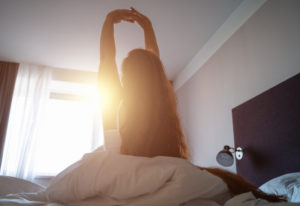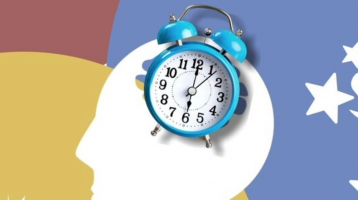There is a growing body of scientific data on the connection between chronotype and mood, underscoring the fact that natural-sleep wake cycles have a real impact on health and well-being. In the most basic sense, chronotype refers to a person’s activity timing preference. Some people are naturally inclined to be more active and productive during the early part of the day. Others, not so much. Their natural preference skews later, and they tend to be more alert and active during the afternoon or evening.
The timing of activity and alertness cycles is tied to sleep-wake cycles. Studies have shown that those with an evening-oriented chronotype have a higher risk of mood disorders, depression and other health problems.
The Different Chronotypes

Most people are bears, with a cycle that is more in tune with the cycle of the sun. They wake easily in the morning and prefer to schedule activities earlier in the day. Their peak period of productivity tends to be before noon, and they often feel an energy drop between 2:00 p.m. and 4:00 p.m. Bears usually fall asleep easily.
Lions are early risers who are often up before dawn. Their peak activity and productivity period ends at about noon. Unsurprisingly, lions like to go to bed early, often between 9:00 p.m. and 10:00 p.m.
Conversely, a wolf is not a morning person. Waking up early is a struggle often involving alarm clocks, back-up alarm clocks and snooze button mashing. It takes a while for a morning-rising wolf to feel his best. A wolf’s energy period is usually from noon to about 4:00 p.m., with a second wind at around 6:00 p.m.
Dolphins tend to be most active and productive between 10:00 a.m. and 2:00 p.m. However, they often struggle with poor sleep quality and are easily disturbed by environmental factors, such as light and noise.
Connecting Chronotype and Mood
Our bodies – right down to the cellular level – operate on an approximately 24-hour cycle. This cycle evolved over tens of thousands of years, and is deeply rooted in the natural cycle of light and dark; the rising and setting of the sun. Thus, it may come as no surprise that people who have a natural rhythm that is out of sync with that most basic of rhythms, wolves and dolphins, have a higher risk of mood disorders, depression and a variety of physical health problems. Researchers have found that people who tend toward “eveningness” also experience more severe depression symptoms.
That’s not to say, however, that morning people don’t suffer from mood disorders or depression. Clearly, they do, on occasion. However, numerous studies have found that they have a lower risk of these disorders. Among those who do develop mood disorders or depression, morning people tend to have better mental health treatment outcomes.
While the connection between chronotype and mood is consistent across numerous studies, directionality remains unclear. Further research is needed to determine whether mood disorders and depression cause the evening activity rhythm or if it is the “eveningness” itself that causes mood disorders and depression.
Shifting Sleep-Wake Patterns
Some researchers question whether attempting to reset sleeping and waking patterns can have positive health impacts, reducing the health risks associated with being evening-activity oriented. Studies have shown that genetics play a role in both chronotype and depression. For example, PER2 and RORA are two genes that impact both. However, environment and light exposure also have a powerful influence. If a person’s genes are not the sole driver of chronotype, then it may be possible to gradually shift from being evening-active to being daytime-active. After all, chronotype changes do occur naturally at different life stages, such as during adolescence and old age.

The Bottom Line
Whether one is an early bird or a night owl, a bear or a wolf, getting enough good quality sleep is essential to optimum mood, cognitive performance and mental health. For those experiencing mood problems or depression, it is certainly worth trying both paths – adjusting the sleep-wake cycle and attempting to match life schedule to chronotype – to see which one of these approaches works best.







